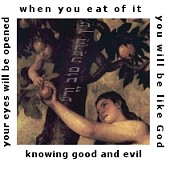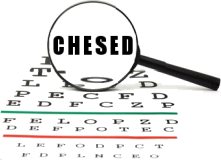|
July 2008 Updates
Urgent Prayer Request. On 7/25 I was laid off from my regular job and I am now out of work.... With a new baby coming, I can't see how we will be able to afford health insurance coverage, let alone meet other expenses. My wife is understandably worried, though we are both trusting God for the outcome....
This is a time for me to ask you to pray for us in earnest. Frankly, I don't have any options lined up -- and no one is asking me to come work for them. Nonetheless, I am seeking the LORD God of Israel's face and guidance through all of this. Agree with me that He will intervene as Adonai Yireh (יְהוָה יִרְאֶה), "the One who sees [our need]."
Meanwhile, with God's help I will continue working on the Hebrew4Christians site while I look for a new job opportunity. Please agree with me in prayer for the Lord's will to be done in our lives. Todah, chaverim.

Note: For those of you who have sent us a donation during this difficult time, please accept our heartfelt appreciation! I would love to work on Hebrew4christians full-time and perhaps start a world-wide learning center, but my book sales are insufficient to cover our basic living expenses (in fact, we are still in debt over the costs associated with producing A Year Through the Torah). We are trusting that the LORD will make a way for us, however. Your prayers for Olga and me help sustain us....
What about Kabbalah?

07.31.08 I realize there's a lot of nonsense out there -- and countless ways for people to engage in self-deception. Consider the popular rise of Kabbalah (קַבָּלָה), for instance. Kabbalah means "that which is received" and refers to the long history of mystical thinking within Jewish tradition. Serious Kabbalah study (as opposed to New Age, trendy nonsense) is closely connected to traditional Jewish texts, teachings, and theology -- and is incomprehensible without them. It's been said that attempting to understand Kabbalah without first understanding Torah, Talmud, Midrash, minhagim (customs), etc., is like trying to fathom quantum mechanics without first mastering high school physics.
That said, and despite the claim by many of its practitioners that the "hidden Torah" traces back to the patriarch Abraham (and even to Adam in the Garden of Eden), Kabbalah is essentially a Jewish form of Neoplatonic philosophy, that is, an attempt to synthesize Hellenism (i.e., the Greek thinking of Plato and Aristotle) and Gnosticism with Judeo-Christian revelation. As such, it is a "panentheistic" (God-is-in-everything-yet-is-above-everything) system. The Neoplatonic idea of "the One" as utterly transcendent and beyond "Being" is renamed as "Ein Sof"; the divine emanations are renamed as "sefirot"; the descent (and ascent) of the soul and the role of gnosis as a means to salvation is refashioned as various meditative techniques, and so on.
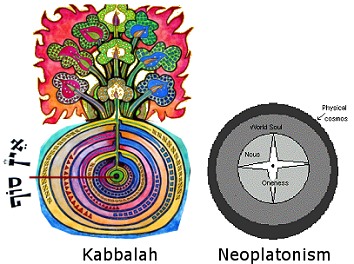 |
For most Christians, Kabbalah is considered dangerous, though it should be pointed out that there are different kinds of Kabbalah, some of which are decidedly occultic (e.g., so-called "hermetic Kabbalah"), while others resemble the theological speculations and discussions of Medieval Christian theology. To say that all Kabbalah is dangerous (or deceptive) is therefore a bit misleading, though a case can be made that much of it is spiritually distracting.
At any rate, I am considering writing a full-length article on Kabbalah, but I want to be careful not to offend or alarm any of you. My intention for doing so would be strictly educational. I would be careful to define 1) the varieties of Kabbalah, 2) the basic ideas of each major variety, and 3) how we (as followers of Yeshua) might respond to these ideas. Please let me know if you'd like me to pursue this subject....
Thoughts about Tishah B'Av

07.30.08 Tishah B'Av (תשעה באב, the "ninth [day] of [the month of] Av") is an annual day of mourning that recalls the many tragedies that have befallen the Jewish people over the centuries, but most especially the destruction of the Holy Temple and the ongoing galut (exile) of Israel. This year Tishah B'Av begins Saturday, August 9th at sundown.
Spiritually speaking, Jerusalem, and in particular Mount Moriah (i.e., the Temple Mount), is considered the most important place on earth, for the following reasons:
- According to the Jewish sages, God began the creation of the universe there, and the bedrock at Moriah is called Even ha-Shetiyah (אבן השתייה), "the Foundation Stone," referring to the creation of the earth on the First Day (Isa. 28:16).
- The dust of Moriah is said to have been used to create Adam (who was later placed in the "garden which lay to the East"). As will be seen, man was created from the place of his atonement.
- According to common Jewish tradition, Moriah was the place that Adam first offered sacrifice, as did his sons Cain and Abel. So did Noah and Abraham. King David and Solomon set the altar for the First Temple there.
- It was in Jerusalem that Abraham met with Malki-Tzedek (Gen. 14:18; Heb. 7:1).
- Abraham offered Isaac on Mount Moriah (Gen. 22:1-19). This is known as Akedat Yitzchak or "the binding of Isaac" and clearly prefigures the sacrifice of God the Father of Yeshua His Son (see below for more on this).
- Isaac met his bride there (Gen. 24:63-67). This is a picture of the bride of the Messiah.
- Jacob had his dream of the ladder to heaven there (Gen. 28:10-22).
- Moses foresaw the Holy Temple (Ex. 15:17) and was given its blueprint at Sinai (i.e., the Miskhan or Tabernacle).
- According to the Talmud, Jerusalem was named by God. The name has two parts: Yira, which means "to teach," and shalam, which means "peace." Jerusalem is the place where God would teach humanity the meaning of peace, through the Prince of Peace, Yeshua the Mashiach, and His sacrifice for humanity.
- King David made Jerusalem the capital of Israel (2 Sam. 24:18-25).
- Solomon built the First Temple there (1 Kings 6-8; 2 Chron. 3:1-2).
- Zerubbabel and Nehemiah built the Second Temple there (Neh. 4-6). Later, King Herod (37-4 BC) remodeled and enlarged it, but the Romans destroyed it in 70 AD (the massive retaining wall (the Kotel or Wailing Wall) that encompass Mount Moriah is all that remains of the Second Temple).
- We are explicitly commanded to pray for the peace of Jerusalem (Ps. 122:6).
- The LORD Jesus called Jerusalem the "City of the Great King" (Matt. 5:35) and had special affection for it (Matt 23:37). He attended the festivals there (Luke 2:43, John 2:23), taught there, and performed His sacrificial work there (Matt. 16:21).
- Jesus was crucified in Jerusalem, just to the north of Moriah at Golgatha (Matt. 27:33). There is also sound archaeological evidence to suppose that the place of the crucifixion of Jesus was at the summit of Mt. Moriah, probably near the present-day Damascus Gate.
- Jesus was raised from the dead in Jerusalem (Luke 24:46-7).
- Jesus ascended from Mount Olives in Jerusalem (Acts 1:12).
- The Church was born in Jerusalem (Acts 1:4,8,12; 2:1-40).
- The Apostle Paul kept the Jewish festivals and ceremonial laws in Jerusalem (even after coming to faith in Jesus as His Lord - see Acts 18:18; 20:6; 21:20-24) and was willing to be killed there for the sake of Jesus (Acts 21:13).
- The writer of the book of Hebrews calls Jerusalem "the City of the Living God"
(Heb. 12:22).
- Jerusalem is the place where the Third Temple (tribulation temple) will be built
(Rev. 11; Matt. 24).
- Jerusalem is the place where the LORD Jesus will return in glory
(Zech. 14:4; Acts 1:12; Matt. 24).
- Jerusalem is the place where the Fourth Temple (millennial temple) will be built (Ezek. 40-45).
- Jerusalem is the name of the coming paradise of God, which descends upon the earth after the millennial reign of Messiah (Rev. 3:12, 21:2,10).
- Jerusalem is the most frequently occurring place name in the Scriptures, mentioned over 800 times (Zion is mentioned an additional 152 times). Note that although Scripture sometimes calls all of Jerusalem "Zion," Mt. Zion lies about half a mile to the West of Moriah. In ancient times a deep valley separated Mt. Zion from Mt. Moriah, but today rubble from Jerusalem's many destructions completely fills this valley. Just east of Mt. Moriah is the Mount of Olives which is about 300 feet higher than the high points of Mt. Zion or Mt. Moriah. Jesus ascended to heaven from the summit of the Mt. of Olives according to Acts 1:1-12 and will make his triumphant return to earth from the same location, according to Zechariah 14:4.
A famous midrash sums up the sentiment of many Jews regarding Jerusalem and the Holy Temple:
"As the navel is set in the center of the human body, so is the land of Israel the navel of the world; as Jerusalem is in the center of the land of Israel, so is the sanctuary in the center of Jerusalem; as the holy place is in the center of the sanctuary, and the ark is in the center of the holy place, and the foundation stone is before the holy place, so from it the world was founded." (Adapted from Midrash Tanchuma, Kedoshim)
The word moriah (מוריה) comes from the verb ra'ah (ראה), "to see" (with the divine Yah- [יהּ] suffix), and is first explicitly mentioned in the Torah in connection with Abraham's sacrifice of Isaac (known as the Akedat Yitzchak, or "binding of Isaac"). There is a play on words here. It was at Moriah (lit. "seen by YHVH") that Abraham called the LORD Adonai Yireh (יְהוָה יִרְאֶה), "the LORD who sees [our need]" in reference to the provision of sacrifice in Isaac's place.
Consider how the Akedah provides a prophetic picture of the provision of sacrifice made by the Lord Jesus as the "Lamb of God" (Seh haElohim) who "takes away the sins of the world" (John 1:29). Both Isaac and Jesus were born miraculously; both were "only begotten sons"; both were to be sacrificed by their fathers at Mount Moriah; both were to be resurrected on the third day (Gen. 22:5, Heb. 11:17-19); both willingly took up the means of his execution; and both demonstrate that one life can be sacrificed for another – the ram for Isaac, and Jesus for all of mankind. Indeed, the first occurrence of the word love in the Scriptures (אהבה, ahavah, in Gen. 22:2) refers to a father's love for his "only" son who was offered as a sacrifice on Moriah (the very place of the crucifixion of Jesus), a clear reference to the gospel message (John 3:16).
When the Israelites first entered the Promised Land under Joshua, Moses' vision of the Temple (embodied in the Mishkan, or Tabernacle) still burned within their hearts. Nonetheless, it was centuries later when King David purchased the threshing floor of Arunah the Jebusite (2 Sam. 24) and there erected an altar in the hopes of building God "a house" (2 Sam. 7). The LORD forbade David, however, but assigned the actual building of the Temple to his son Solomon (2 Chron. 6:9; 2 Sam. 7:12-14). Later we read that the Shekhinah Glory of the LORD filled Solomon's Temple (1 Kings 8:10-11). After centuries of delay, Moses' vision of the Holy Temple was realized!
Or so it seemed... Solomon's Temple stood for close to 400 years, but because of rampant apostasy was later destroyed in 586 BC by the Babylonians under King Nebuchadnezzar. This was a catastrophic blow to the Jewish heart. Ezra the Scribe later led a return of the exiles to rebuild the Temple (under the auspices of King Cyrus of Persia), but the Ark of the Covenant was apparently missing -- and the Holy of Holies was therefore empty. Nearly 500 years after that, the Second Temple was in such severe need of repair that King Herod the Great refurbished it and expanded its size. This was the Temple that stood in the time of Jesus, who was dedicated there as a baby and taught there during his ministry. However, Herod's Temple was likewise destroyed in fulfillment of Jesus' pronouncements of judgment (Matt. 24:1-2; Mark 13:2; Luke 21:6, 20-24).

During his earthly ministry, Jesus referred to himself as the True Temple of God that dwelt among us. The Mishkan (Tabernacle) was a temporary dwelling place as was the physical Bet Hamikdash (Temple). As Solomon said, God never could be contained in a house made of stone, cedar and gold (2 Chron. 6:18). These were shadows of a greater Substance that entirely embodied the Temple's purpose and essential truth (Col. 2:17). Jesus told the Pharisees of his day that he was greater than the Temple in Jerusalem (Matt. 12:6) and challenged them: "Destroy this Temple, and in three days I will raise it up" (John 2:19-21). Jesus is the Shekhinah - the Presence of God - manifested in the temple of human form: "For in him the whole fullness of deity dwells bodily" (Col. 2:9, John 1:1,14). As the Lamb of God, Jesus is not only the Kodesh Hakodoshim (Holy of Holies) -- embodied within a human heart of flesh -- but also the substance and end of all sacrifice (Heb. 10:12). When his flesh was destroyed on the Cross, the curtain of the Temple was likewise rent asunder (Matt. 27:50). Access to the inner sanctum of the LORD was thenceforth made available to all who would come to him in faith. Jesus alone is the Spirit, Source and the End of the true Temple of God.
But what about the great promises of God that one day the Temple would be restored upon the earth (Isa. 65, Ezek. 40-48, etc.)? What about the promised regathering of Israel from among the nations (Deut. 30:3-5; Neh. 1:8-9; Ezek. 37:11-12, 21; Ezek. 39:28; Zeph. 3:19-20, Acts 15:16, etc.)? Do not Jews from around the world pray for this very thing every single day? (See the 17th blessing of the Amidah prayer.) And don't the Jewish sages, based on reasoning directly implied by the Hebrew prophets, still speak of yemot Hamashiach (the "days of the Messiah") and a coming Messianic Era? Won't the Messiah usher in a new era of peace for humanity and restore national Israel to her greatness? According to some of these sages, the Messiah will usher in Yom YHVH, the "Day of the LORD" and then the sabbatical millennium, the 1000 year reign of King Messiah, will commence. Prior to the arrival of the Messiah, however, will be the "time of Jacob's trouble," the acharit hayamim, or the "end of days" (note how this coheres with the Christian expectation of the Great Tribulation and the Second Coming of Jesus).
 |
Since we understand that Jesus is the true Temple and the beginning and end of all sacrifice, what are we to make of the prophesied "Millennial Temple" (i.e., the Fourth Temple of the Millennial Kingdom - not the Third Temple spoken of during the Tribulation period in Matt. 24:15-21, 2 Thess. 2:1-4)? This Fourth Temple will be built after the Second Coming of the Jesus as Mashiach ben David (Isa. 2:2-3; Ezek. 37:26; Micah 4:1-2, 7; Joel 3:21; Mal. 3:1, Ezek. 40-45, etc.). Does this represent, metaphorically, the presence of redeemed (ethnic) Israel (i.e., 1 Pet. 2:5), or should we expect to see a literal Temple built, complete with a restored Levitical priesthood, animal sacrifices, and so on, along the lines of Ezekiel's detailed vision (Ezek. 40-45)?
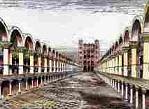
Exegetically, the description of the Fourth Temple ("Ezekiel's Temple") does not read as a metaphor in Scripture: the language used is replete with precise measurements and architectural terms. Moreover, there are distinct changes to its functioning from that of Mosaic revelation. For instance, there is no "wall of partition" between Jews and Gentiles, no appointed High Priest, no special furnishings in the Holy of Holies, and so on (for more information, see Lambert Dolphin's excellent article here). And even though animal sacrifices will be offered at this Temple (Ezek. 43:18-46:24), this in no way impugns the "once and for all" sacrifice of Jesus. It must be remembered that animal sacrifices never could take away sin (Heb. 10:4,11), and therefore there's no reason to think that sacrifices offered in the Millennial Temple will be anything other than memorials of the finished work of Jesus.
The Millennial Kingdom itself appears to be an "intermediate period" in God's plan for the ages - the "Seventh Day" of Creation that foreshadows something deeper still. That "something deeper still" is the eternal state of olam habah, the world to come, and the heavenly city of New Jerusalem:
"And I saw no temple in the city, for its temple is the Lord God the Almighty and the Lamb. And the city has no need of sun or moon to shine upon it, for the glory of God is its light, and its lamp is the Lamb." (Revelation 21:22-23)
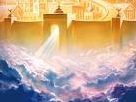
There are a lot of mysteries in the overarching plans and purposes of the Lord, chaverim. One thing is certain, however, and that is that the New Covenant has not been entirely fulfilled, since Jesus is not presently seated on David's throne (on earth) and Israel's full participation and centrality has not yet occurred:
"Behold, the days are coming, declares the LORD, when I will make a new covenant (בְּרִית חֲדָשָׁה) with the house of Israel and the house of Judah, not like the covenant that I made with their fathers on the day when I took them by the hand to bring them out of the land of Egypt, my covenant that they broke, though I was their husband, declares the LORD. But this is the covenant that I will make with the house of Israel after those days, declares the LORD: I will put my law (תּוֹרָה) within them, and I will write it on their hearts. And I will be their God, and they shall be my people. And no longer shall each one teach his neighbor and each his brother, saying, 'Know the LORD,' for they shall all know me, from the least of them to the greatest, declares the LORD. For I will forgive their iniquity, and I will remember their sin no more."
Thus says the LORD, who gives the sun for light by day and the fixed order of the moon and the stars for light by night, who stirs up the sea so that its waves roar - the LORD of hosts is his name: "If this fixed order departs from before me, declares the LORD, then shall the offspring of Israel cease from being a nation before me forever." Thus says the LORD: "If the heavens above can be measured, and the foundations of the earth below can be explored, then I will cast off all the offspring of Israel for all that they have done, declares the LORD" (Jeremiah 31:31-36).
The Temple of the LORD is already here -- in the Person of the resurrected Messiah -- and yet it will be made fully manifest in the days to come: First in the Millennial Kingdom (after Jesus' Second Coming), and later still in olam habah (the world to come) as the eternal community of those redeemed by the Lamb of God (Rev. 21:22-23). So for those of us who hold faith in Yeshua as the Messiah, our mourning for the Temple is really mourning for the Presence of our Beloved Savior. May He come quickly, and in our days...
At the Fork of the Road
07.29.08 I read a wonderful quote today that I thought I would share with you, chaverim. It relates to this week's Torah portion (Masei):
A Jew must feel at all times that he is on the fork road of life. The path that he chooses will either elevate him to spiritual heights, or degrade him to the lowest level. Our chachomim state: "On the path that a man wishes to follow, he will be lead (Makot 10). They also state, "To be wicked, the entrance will be opened for him; to be purified, he will be helped (Shabbos 104, Yuma 38). Heaven will not prevent him from doing evil, but if he wishes to be pure from sin, he will be assisted from on high. (R' Yechiel Michael of Zlotsov)

Some of the Jewish sages consider each trek in the journey of the Israelites in the desert to be a "stage of ascent" from the forty nine levels of impurity (tumah) that obtained when the people lived as slaves in the house of slavery (Egypt). The desert route, then, is symbolic of both a progressive deliverance from sin and a progressive sanctification to take possession of the revelation of the Torah. Indeed, the departure from Egypt is mentioned 50 times in the Torah, alluding to the 49 gates of impurity that led to the 50th gate of understanding.
"If man truly desires to further himself from lewdness, which awaits him at every turn, and wishes to live a righteous life, free from sin, then he must fully recognize that this world is but a courtyard (חָצֵר) to the next and true world." (R' Yizchok of Vorka)
Hence again we see a Shavuot (Pentecost) connection with the last Torah portion of the Book of Numbers. God never wastes the trials in our lives. Every setback we face is a means He uses to teach us to revere His holy name (Rom. 8:28). Yeshua is our manna (Bread from Heaven) and our life-giving Rock that sustains us in our journey....
Yahrzeit and Tishah B'Av
There is also a Tishah B'Av connection with this week's Torah portion. In Numbers 33:38 the death of Aaron the High Priest is described as occuring "on the first day of the fifth month" [i.e., the first day of the month of Av]. Rosh Chodesh Av is therefore the yahrzeit (anniversary of the death) of Aaron, the first High Priest of Israel (the only yahrzeit explicitly mentioned in the Torah). According to some sages, this attack by Satan on the service of the Mishkan (tabernacle) foreshadowed that the Temple would one day be destroyed in the month of Av. This explains, then, why the first of Av begins an increased time of mourning leading up to Tishah B'Av.

Notice something remarkable here. Since the Torah ends with the Book of Numbers (Deuteronomy is called מִשְׁנֵה הַתּוֹרָה, mishneh ha-Torah - a review or "repetition" of the Torah), Jewish tradition assigns great weight to death of Aaron since it repesents the loss of the Jewish Temple. Similarly, we assign great weight to the death (and resurrection) of our greater High Priest after the order of Malki-Tzedek -- Yeshua the Mashiach -- and the greater Temple represented by His body (John 2:19).
Parashat Masei - פרשת מסעי
07.27.08 The Torah portion for this coming Shabbat is Masei ("journeys of," from masa, "breaking camp," referring to a "stage" or camp site in a journey). Parashat Masei is the tenth and final portion of the Book of Numbers.

The boundaries of the Promised Land (הָאָרֶץ הַמֻּבְטַחַת, ha'aretz hamuvtachat) are provided in this portion of Torah. Note that the borders of the land given do not correspond with the reality of any historical settlement of Israel, so the actual possession of the land by Israel is yet to be fulfilled.
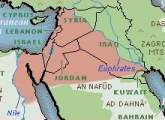
Parashat Masei is traditionally read near the new moon of the month of Av, in anticipation of the nine days of mourning (for the lost Temple) that precede Tishah B'Av -- the saddest day of the Jewish calendar (Tishah B'Av begins Saturday, August 9th at sundown this year). The Mishnah states, "As [the month of] Av enters, we diminish joy," and the Gemara states, "All who mourn the destruction of Jerusalem will merit the celebration of her rebirth" (Ta'anit 30a). Mourning for the loss of the Temple is appropriate until the Mashiach comes and restores it. Masei is read at this time to signal hope that one day Jerusalem will be rebuilt and the promises made to Israel will be fulfilled.
When someone dies, there is a grieving process you can go through that leads to closure. In Jewish tradition, this process involves the stages of shivah, sheloshim, and avelut - a full year of grieving over the loss of a loved one. If, however, it's uncertain that someone has died, there is no end to mourning. We see this Jacob's life after his son Joseph disappeared: Jacob wasn't certain of his son's death, and therefore he mourned for years and years. He continued to mourn because he still held hope that his son lived. For this very reason do we both mourn and yet hold hope during the Three Weeks of Sorrow and Tishah B'Av. We mourn over the loss of what could have been, yet we hold hope in the restoration of Jerusalem, the "City of the Great King" (Psalm 48:2, Matt. 5:35) by the hand of Yeshua our Mashiach....
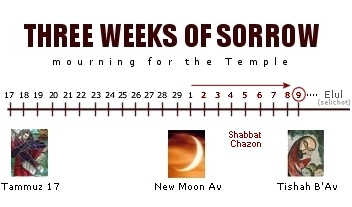 |
 |
New Hebrew Meditation: Shocher Tov - שׁחר טוב
07.21.08 I wrote a new Hebrew meditation (Shocher Tov) based on Proverbs 11:27, "Whoever diligently seeks good seeks favor, but evil comes to him who searches for it." I hope this will encourage you, chaverim.

Tzom Tammuz - צום תמוז
Today is the 17th of Tammuz, a fast day (tzom) that marks the beginning of the "Three Weeks of Sorrow" (a 21 day period of national mourning which is completed on Tishah B'Av (which begins Saturday, August 9th at sundown this year)). The purpose of the fast is to instill a sense of teshuvah (repentance) by recalling specific tragedies that befell the Jewish people during this time. When the Mashiach Yeshua returns (may it be speedily in our time), the Three Weeks will turn into a time full of "gladness and cheerful feasts" (Jer. 31:12).
Note: I will be out of town for a few days and unable to access email or provide site updates. Shalom.
Parshat Mattot - פרשת מטות
07.19.08 The Torah portion for this coming Shabbat (Mattot - "Tribes," from mateh, a tribal staff) connects the making of vows (nedarim) with the vengeance upon the Midianites who had enlisted the wicked prophet Balaam to cast an evil curse on Israel.

If I get some time later in the week I will try to add some additional comments about this portion of Torah. Shalom, chaverim....
Did Jesus Speak Hebrew?
07.17.08 Every so often I get asked the question of whether Jesus (Yeshua) really spoke Hebrew (rather than Aramaic, Greek, or even Latin). After all, there seems to be some Aramaic words in the New Testament, and the text itself is written in Koine Greek. Today I wrote a brief article (available here) that takes a look at the question.

The life is in the blood - כִּי נֶפֶשׁ הַבָּשָׂר בַּדָּם הִוא

07.16.08 Today someone asked me what to make of Yeshua's statement, "Unless you eat my flesh and drink my blood, you shall not have life within you" (John 6:53).
Well, as you undoubtedly know, the Torah strictly forbade Jews from drinking blood (Lev. 17:10-12). The life that was "in the blood" was reserved for sacrificial atonement upon the altar of YHVH. Yeshua's statement, then, is perhaps best understood as hyperbole meant to scandalize. Yeshua was trying to shake the disciples out of their preconceptions, similar to the way he dashed their hopes of a reformed Judaism when he predicted the coming destruction of the Holy Temple (Matt. 24:2). On the other hand, he was clearly associating his sacrifice on the Cross with the ritual of the Passover Seder....
Yeshua used many metaphors in his teaching. For example, in John's Gospel (from which the quotation about drinking blood comes), Yeshua called himself "the bread of life" (John 6:48), "the light of the world" (John 8:12), "the door" (John 10:9), "the true vine" (John 15:1), and referred to his body as the Temple (John 2:19). That doesn't mean we should consider him a loaf of challah, a cosmic lightbulb, a door with hinges, a leafy plant, or that his physical body somehow resembled the Temple of Herod...
When Yeshua taught at the synagogue in Capernaum, he referred to himself as the Living Bread (לֶחֶם חַיִּים) that came down from heaven.
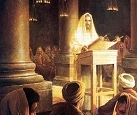
Just as the physical manna sustained the Jewish people in the desert, so the heavenly manna embodied in the life of Mashiach would sustain his followers forever. Yeshua identified this heavenly manna with the sacrifice of his flesh: "the bread that I will give is my flesh, which I will give for the life of the world" (John 6:51). When his audience questioned this, Yeshua went on to say, "Truly, truly, I say to you, unless you eat the flesh of the Son of Man and drink his blood, you have no life in you. Whoever feeds on my flesh and drinks my blood has eternal life, and I will raise him up on the last day. For my flesh is true food, and my blood is true drink" (6:52-53).
Some of Yeshua's disciples were mystified by his teaching and said, "This is a hard saying; who can listen to it?" But Yeshua then asked them: "Does this offend you?" He further asked what they would think were they to see the Son of Man ascend to where he came (referring to the idea of manna that came down from heaven). Notice his further explanation: "It is the Spirit who gives life; the flesh is of no avail. The words that I have spoken to you are spirit and life" (John 6:60-64).
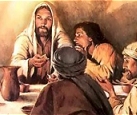
Later, near the end of his earthly ministry, Yeshua celebrated his last Passover Seder with his disciples. It was there that he again spoke of "drinking" the "blood of the covenant which is "poured out for many for forgiveness of sins." He went on to say, "I will not drink of this fruit of the vine from now on until that day when I drink it new with you in My Father's kingdom" (Matt. 26:26-30). Note the context here: A Passover Seder. The fruit of the vine is represented by the (third) Passover cup (the "Cup of Redemption"). The same can be said regarding the eating of the Afikomen (matzah), identifying it with the breaking of his body. Luke's Gospel adds that this ritual act was to be done "in remembrance of me" (Luke 22:19). Paul later confirms the association as a symbolic act of remembrance, similar to other Jewish Passover Seders (1 Cor. 11.23-26). The shock value of the hyperbole Yeshua used was intended to show that this Seder symbolizes the New (and greater) exodus, gained at the expense of his own shed blood and broken body. Moreover the Mishnah (Pesahim 10:6) interprets the Passover wine as a metaphor for blood that seals a covenant between God and his people. The life is in the blood. The cup symbolizes completely identifying with the life and mission of the Mashiach. It is not some mystical ritual carried over from ancient mystery religions and later incorporated into the Catholic Mass, etc.
 |
Swimming in the Sea
07.15.08 Recently I was asked why I didn't present the gospel message in a "simple and straightforward" manner, such as the modern method of sharing the "Four Spiritual Laws" (created in 1965 by Bill Bright, with over 2.5 billion booklets "served") or by using some other canned formula for presenting the truths of Christianity.

By way of response to this, let me first quote from Adin Steinsaltz regarding the study of the Talmud:
The Talmud is not a schematic textbook, but essentially a slice of life. As such, it commences for no person at the beginning. When a person begins to study Talmud, he always finds himself right in the middle of things, no matter where he starts. Only through study and combination of facts can he arrive at the ability to understand what he has already studied; his comprehension grows constantly deeper as he peruses the material over and over again. (The Essential Talmud, p. 274)
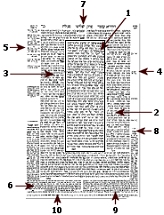
The Talmud, then, is part of an ongoing dialog about the Scriptures. A typical page of a modern edition (called a daf) is jam-packed with quotations from the Torah, margin notes, cross-references, debates about the meaning of terms and ideas, ongoing dialogs, various ethical stories, intense legal reasonings, and of course commentary upon commentary (upon commentary upon commentary).
The principle that we always find ourselves "right in the middle of things, no matter where we start" shouldn't discourage us. The same can be said of the Scriptures themselves, after all, since our point of entry today is different than it would have been, say, had we lived in ancient Israel under the reign of Solomon. The important point is to understand the context of the words we read and to take heed of the discussions of others who have gone before us. This is just as true for the modern Christian as it is for the Jew who regularly studies Talmud. We miss out on so much if we forget our history, our roots...
The modern way of learning Talmud involves impassioned discussion and dialog. Truth is never attained in isolation (like Socrates staring off in abstracted frozenness), but in chavruta (pairs), or in the midst of a greater chavurah (circle of friends). And this conversation goes on and on, throughout the generations, helping us see our connection with others who have likewise struggled to live out their faith and make it their own. The sound of their voices together form a greater song - of yearning, of questioning, of shared hope. Our talk, our heartfelt discussions, the sharing of our burdens, is likewise made part of this greater song.
Unfortunately many people find this notion unsettling. They would prefer, as Soren Kierkegaard once said, to "arrive at conclusions in life much the way schoolboys do... by copying the answer book without having worked the problem out themselves." But this approach will never do for those who seek the truth. We must work the problem out for ourselves. We must press forward. As Kierkegaard says elsewhere:
It is perfectly true, as philosophers say, that life must be understood backwards. But they forget the other proposition, that it must be lived forwards. And if one thinks over that proposition it becomes more and more evident that life can never really be understood in time simply because at no particular moment can I find the necessary resting place from which to understand it backwards.
We are on a journey, chaverim... There is no way we can transcend the world in order to make of it an object suitable for observation, and yet paradoxically certain theologians (Christian and otherwise) have attempted to transcend the Person of the Living God in order to make Him the "subject" of their study using (Greek-based, i.e., pagan) methods. Evidence of this may be seen in musty bookshops that sell the theological works of the "church doctors" or in various seminaries that teach theology classes. Evidence may also be seen in creedal formulas, doctrinal statements, denominational divisions, ethnocentric exclusiveness, jihad-thinking, and so on.
The professional "scribes and clergy" of our day seem to overlook the reality and Presence of the resurrected Teacher who said, "The wind blows where it wishes, and you hear its sound, but you do not know where it comes from or where it goes; so it is everyone who is born of the Spirit [ruach]" (John 3:8). The study and refinement of doctrine is an afterthought, a pause, a reflection, an attempt to exercise control. Such theologizing often attempts to justify elitist notions of a "professional clergy," or "doctrinal purity," or an "personal holiness" -- even as it feeds on controversy, stirs up fear, and regularly attends to the affairs and doctrines of mere men. Why else are there countless sermons centered on a "problem" of one kind or another?
The Spirit of Truth (רוּחַ הָאֱמֶת) is our sure guide, and it is the love of the truth that brings us to salvation (2 Thess. 2:10-12). Each of us is called to go into all the world to make talmidim (תַּלְמִידִים) -- disciples -- a word that shares the same root found in the word Talmud (תַּלְמוּד). Yeshua is our Teacher who writes his message upon the hearts of those who will believe.... "But we have this treasure in jars of clay, to show that the surpassing power belongs to God and not to us" (2 Cor. 4:7).
The gospel message is called "simple" (απλοτης), from the same word used by Yeshua to describe the "good eye" (ayin tovah) in Matthew 6:22 (see below for more information). It does not mean, then, simplistic, but rather sincere, single-hearted, and free from pretense. Sharing our faith with others doesn't mean we should present "Four Spiritual Laws" to them as much as it means that we should be revealing to them our passionate devotion to the LORD. "Go into all the world and preach the gospel -- and sometimes use words."
United we stand, divided we fall, chaverim... It's never about some "star" teacher or pastor or healer. All learning of real, infinite, and eternally significant value comes from the Teacher Himself and is meant to be shared within the redeemed community. Everyone has a part in the greater conversation about the life of faith. Part of the work I do at Hebrew4Christians is merely to provoke discussion in order to help you engage the LORD (and others) with honesty... Beware of any teacher who does not regard him/herself as a vanishing point whose sole purpose is to help you see the glory of Yeshua more clearly. As the prophet said, "I must decrease, but he must increase" (John 3:30). Yeshua alone is the Source and Goal of all reality and truth: "All things were created by him and for him; all things are held together for his purposes" (Col. 1:16-17).
 |
The Gospel of Pinchas
07.15.08 In my parsha study of Pinchas, I noted that the broken Vav that appears in Numbers 25:12 is a textual oddity that alludes to the brokenness of the Messiah for our ultimate deliverance.

Since Vav represents the number of Man, the broken Vav represents a man that is broken. This verse then points to a man has been broken for the sake of a covenant of peace that brought atonement to Israel - a clear picture of Yeshua the Mashiach and His ultimate deliverance for us. Note further that the broken word shalom could also be read as שׁלים, meaning "complete," indicating that the covenant is one of completion, finality, and perfection.
According to the sages, the covenant of peace was a guarantee to Pinchas that he would free from the influence of the malakh ha-mavet (the Angel of Death). Therefore Pinchas was transformed into the prophet Elijah who was taken up and never died. Because Pinchas kept the people true to their circumcision, he merited being present at every Brit Milah, and therefore the "Chair of Elijah" is really the Chair of Pinchas!
There is another textual oddity regarding this matter. The letter Yod in the name Pinchas (Num. 25:11) is undersized. As the smallest of the Hebrew letters, the Yod is considered a picture of humility. The zeal of Pinchas is therefore understood in light of his humilty and devotion. Even though Pinchas had executed judgment on behalf of the LORD, he was given peace.
The sages further note that the Hebrew the phrase, "he [Pinchas] made atonement for the people of Israel" (וַיְכַפֵּר עַל־בְּנֵי יִשְׂרָאֵל) does not use the standard לכפּר construct ("to atone" for) but instead uses יְכַפֵּר, and therefore could read: "he atones for Israel till the end of all generations."
The idea of the "Covenant of Peace" (בְּרִית שָׁלוֹם) appears throughout the Scriptures, of course, and is made explicit in the Brit Chadasha (New Testament). Therefore one of the Names of God is "The God of Peace" (אֱלהֵי הַשָּׁלוֹם). God has made peace with mankind through the sacrifice of His Son Yeshua (Rom. 5:1):
He has delivered us from the domain of darkness and transferred us to the kingdom of his beloved Son, in whom we have redemption, the forgiveness of sins... And, having made peace through the blood of his cross, he reconciled all things to himself... (Col. 1:13-14,20)
Yeshua is the true Peacemaker who is called "the Prince of Peace" (שַׂר־שָׁלוֹם, Isa. 9:6). He is the bechor (firstborn, πρωτοτοκος) of all creation; the radiance (zohar) of God's glory, and the exact representation ("stamp," "imprint" or "die") of his God's essence and Person (χαρακτηρ της υποστασεως του Θεου - "the character of God's substance" (Heb. 1:3)). All things were created by him and for him, and in him all things subsist (Col 1:16-17). Indeed, in "all things" Yeshua has the preeminence. To all those who submit by faith to the sacrifice of God's Son for their sins, the LORD offers a new covenant of peace, an Eternal Healing of the rift between God and man.
Parashat Pinchas - פרשת פינחס
07.14.08 Last week's Torah portion concerned the evil King Balak and the wicked prophet Balaam, but this week's portion is about the heroic zeal of Pinchas (Phinehas), the late-born grandson of Aaron the priest, to whom the LORD awarded a brit kehunat olam, a "covenant of a perpetual priesthood." As you will see, Pinchas is a picture of the Messiah Yeshua, and the covenant of priesthood given to him is a picture of the greater priesthood after the order of Malki-Tzedek.

Traditional Jewish thinking maintains that when Aaron received the promise of the priesthood from the LORD, it applied only to his future children and their descendants. Since his grandson Pinchas had already been born at the time the promise was given, however, Pinchas did not automatically receive this honor, especially since his father Eleazar (the son of Aaron) was married to an "outsider" -- namely, the daughter of Yitro (also called Putiel, Ex. 6:25). This explains Rashi's statement that the other tribes mocked Pinchas. How dare he kill a nassi (prince) of Israel (i.e., Zimri), especially since Pinchas' mother was regarded as an idol worshipper! Pinchas' zeal for the honor of the LORD, however, overruled their tribalism, and he was appointed a priest with special standing before the LORD.
God looks at the heart, chaverim, and is able to make those who have zeal for Him true priests of the LORD! You don't have to be born Jewish to impress the LORD God of Israel, since He's no respecter of persons (Rom. 2:11). Not only can He create spiritual children of Abraham from the stones of the ground (Matt. 3:9; Luke 3:8), but He can turn someone considered a non-Jew (by the Rabbis, anyway) into a priest of Israel (1 Pet. 2:9-10). Indeed, many descendants of Pinchas later became the most faithful of the High Priests of Israel during the First Temple period.
Note that a midrash (legend) states that when Pinchas entered Zimri's tent to kill him, thousands of men from the tribe of Shimon ran in after him, seeking his life. Pinchas was in such a state of terror that "his soul left him" and the souls of Nadav and Avihu (Aaron's deceased sons) entered his body -- and by this means he became a Kohen.
Parashat Pinchas (like parashat Emor in Vaiyikra) also includes mention of all of the (sacrifices of the) mo'edim (holidays) given to Israel (Num. 28): Daily (tamid), Shabbat, Rosh Chodesh (monthly), Passover, Shavuot, Rosh Hoshannah (Terumah), Yom Kippur, and Sukkot are all given. Remembering the joys of the Temple and the special celebrations of the Jewish people adds poignancy to an otherwise somber time of reflection during the Three Weeks of Sorrow (see below).
 |
Three Weeks of Sorrow
07.13.08 Sunday, July 20 is the Fast of Tammuz, a fast day that marks the beginning of the "Three Weeks of Sorrow" (a 21 day period of national mourning which is completed on Tishah B'Av (Aug 10th)). The purpose of the fast is to instill a sense of teshuvah (repentance) by recalling specific tragedies that befell the Jewish people during this time. When the Mashiach Yeshua returns (may it be speedily in our time), the Three Weeks will turn into a time full of "gladness and cheerful feasts" (Jer. 31:12).
Ayin Tovah - Seeing the Kingdom
07.10.08 Note that the following should be read in light of my previous entries about this week's Torah portion (Balak) and the enigmatic prophet named Balaam...
CAREFULLY CONSIDER the following statement: "The optimist believes that this is the best of all possible worlds; the pessimist believes the optimist is right…" Note that both the optimist and the pessimist are believers -- but each is responsible for his own vision. We see what we want to see. As Jesus said, "According to your faith, be it done unto you" (Matt. 8:13, 9:29).

Kierkegaard tells the story of two young portrait artists who both sought to capture the essence of beauty in their paintings. One artist looked high and low for the "perfect face of beauty" but never found it. Tragically, he later gave up painting and lived in despair. The other artist, however, simply painted every face he saw and found beauty in each one. Now here's your question: Which of the two was the sincere artist?

The Eye of the Disciple...
The way we choose to see is ultimately a spiritual decision. The sages say, "Whoever has the following three traits is among the disciples of our father Abraham; and whoever has three different traits is among the disciples of the wicked Balaam. Those who have a good eye (עַיִן טוֹבָה), a humble spirit (רוּחַ נְמוּכָה), and a lowly soul (נֶפֶשׁ שְׁפָלָה) are the disciples of our forefather Abraham; [but] those who have an evil eye (עַיִן רָעָה), an arrogant spirit (רוּחַ גְּבוֹהָה), and an greedy soul (נֶפֶשׁ רְחָבָה) are the disciples of Balaam the wicked" (Mishnah: Pirke Avot 5:22).
According to these early sages, the difference between the disciples of Abraham and the disciples of Balaam turns on the presence (or absence) of these three middot ha-lev (qualities of the heart), though the most important of these is ayin hatovah - the good eye.
The Eye of Abraham...
But what is the good eye? Is this a metaphor for a "Pollyanish" outlook on life -- to play the "Glad Game" by finding the good in every circumstance, no matter how difficult? Is it the practice of a sunny disposition that believes that everything will turn out all right in the end -- reinterpreting all the facts of experience to support the notion that this is the "best of all possible worlds"?
Rashi says that one with a good eye esteems another's honor as his own: It's an eye that respects and values what it sees. The Rambam says that the good eye is the ability of being satisfied with one's lot in life and being happy over the successes of others: It's an eye free from a spirit of envy or greed. Other sages have said that the good eye indicates a generous spirit toward others: It's an outwardly directed eye that shines forth comfort and care to those in need.

A person with a "good eye" looks at things from the perspective of love. Ayin hatovah looks at circumstances -- and especially at other people -- and finds something beautiful.... There is no trace of competition, no envy, no malice in the good eye; there is no harboring of resentment or bitterness. A person with ayin tovah does not speak ill of others nor inwardly wish them any harm. The good eye overlooks the defects of others and sees the virtue and value of the person created b'tzelem Elohim (in the image of God). The Scriptures declare: Tov-ayin hu yevorakh - "The one with a good eye will be blessed" (Prov. 22:9).
The Eye of Balaam...
Abraham Lincoln once said, "When you look for the bad in mankind expecting to find it, you surely will." The evil eye (ayin hara) does not want to see the good in others but relates to other people as threats to the self. It is the eye of fear, mistrust, anxiety, and loneliness. For that reason it does not will the good for others, since it is (inevitably) conscious of itself and its own incompleteness, and the well-being of others testifies of the self's own sickness. It therefore seeks company in darkness and imagines the world in terms that warrant its suspicions. It rationalizes its evil perspective, cynically doubting the motives of others, calling good, evil and evil, good. This distorted view causes an inversion of values, wherein what is important is deemed insignificant, and vice-versa. Eventually this way of seeing leads to madness (settled anger) and a fixed denial of all that is worthy and of value. One sage in the Gemarah says that no less than nine out of ten people die because of an ayin hara. Another states that lashon hara (evil speech) and an evil eye cause the affliction of tzaraat ayin -- the "leprous eye" that is unable to look at things positively. As Jesus said, "Your eye is the lamp of your body. When your eye is healthy (ayin tovah), your whole body is full of light, but when it is bad (ayin hara), your body is full of darkness. Therefore be careful lest the light in you be darkness (Luke 11:34-35).

Tragically, it is possible to have ayin hara toward God Himself. When we doubt His goodness or live in fear of the future, we are not unlike that servant who thought God was "a severe man: You take what you did not deposit, and reap what you did not sow" (Luke 19:21). Our lack of trust removes the light from our path until we find ourselves in the pit of despair, unable to see the way to go. "If then the light in you is darkness, how great is that darkness!" (Matt. 6:23).
The Eye of Faith...

Ayin tovah is the outlook of faith, hope, and love; it is the Kingdom of God Perspective... Seeing others with ayin tovah helps them believe in their worth, and that, in turn, carries over to the world they inhabit. Living by the principle of charity therefore is a means of repairing our world, inviting the best of each other to be disclosed without fear. It is a message of love and grace to others in our lives: You are important; you are valuable; you matter; your life has eternal significance... Choosing to see the best in others often leads them to see their true worth.
"What do you want me to do for you?" They said to him, "Lord, let our eyes be opened." And Jesus in pity touched their eyes, and immediately they recovered their sight and followed him (Matt. 20:32-34). He can open your eyes, too.
The Madness of Balaam
07.08.08 This week's Torah portion (Balak) centers around a strange character named Balaam (Bil'am) who attempted to manipulate the LORD for his own twisted purposes.

Interestingly, the Talmud mentions that Moses wrote a separate book called the "Book of Balaam" (Sota 5), a work that presumably tells the story of Balaam in greater detail than the Torah portion provides (Bava Basra 14b-15a). This non-canonical book did not survive over the centuries, much like other works mentioned in the Tanakh (such as the Book of Yashar (Josh. 10:13, 2 Sam. 1:18), the Book of the Acts of Solomon (1 Kings 11:41), the Book of the Chronicles of the Kings of Israel (1 Kings 14:19, 14:29), the Book of Nathan the prophet (1 Chron. 29:29), etc). But notice that this implies that not everything Moses wrote was considered Scripture (since the book was rejected from inclusion in the Jewish canon).
Jewish tradition considers Balaam to be a prophet with the true gift of nevuah (prophecy), although (paradoxically) he was an adversary of the LORD and an enemy of the children of Israel. The midrash (Bamidbar Rabbah 20) maintains that Balaam was "one who was [potentially] as great as Moses himself", but since he abused his spiritual gifts, he was judged and came to ultimate ruin. Instead of submitting himself to the truth and willingly blessing Israel, Balaam turned away from his true purpose, and "the portion of the Book he was meant to write (i.e., the "Book of Balaam") was decreed to be written by Moses instead." The tale of Balaam, then, is a sober warning to us all.
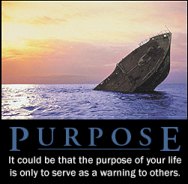
Balaam's legacy is with us today. The New Testament Scriptures speak of "the way of Balaam, the son of Beor, who loved gain from wrongdoing" (2 Pet. 2:15), "Balaam's error" (Jude 1:11), and "the teaching of Balaam, who taught Balak to put a stumbling block before the sons of Israel" (Rev 2:14). Note that the doctrine of Balaam is associated with the licentious "doctrine of the Nicolatians" who "conquered the people" [νικος + λαος] in order to pursue their own ecclesiological/spiritual lusts (Rev. 2:6,14-15).
What is the "way of Balaam" or Balaam's error? Well, though Balaam appeared to follow God's instructions, his inner attitude was actually hostile to God's desire and plan. He was therefore double minded, antagonistic to the way of truth, and therefore literally insane (2 Pet. 2:16). When Balaam told Balak's emissaries that he could "only speak what God put in his mouth," he was being literal, not moral... This is revealed in the fact that he was willing to try three times to curse God's purpose, but every time God thwarted his evil intent (Josh. 24:9-10). Despite God's dramatic intervention in his life, Balaam was unrepentant and defiant, and later succeeded in corrupting Israel by devising a scheme to tempt the men of Israel to commit fornication (Num. 31:16, Rev. 2:14-15).
Balaam was a hireling, a spiritual prostitute who wanted to sell his services. He was in possession of charisma which he used to seduce others into disobedience. He was paid for exercising his gifts without regard for the truth (Num. 22:7, Deut. 23:4-5, 2 Pet. 2:15). As Jesus said, "You cannot serve God and mammon" (Matt. 6:24).
The tragic story of Balaam warns us to check our motives. By itself, the study of Scripture is never enough -- even if we take great pains to properly understand its meaning. Our heart attitude is definitive. Our will to serve God in the truth determines our way in this life. "If anyone wills to do His will he will know of the teaching..." (John 7:17). We cannot rightfully use the Scriptures to justify our ideas about God or own pet theological doctrines. We cannot manipulate God in order to serve our own theological visions... We must humble ourselves, honestly listen, and be willing to surrender to the truth. It is the love of the truth that brings salvation to us (2 Thess. 2:10-12), not gaining power through religious knowledge or passing ourselves off as religious authorities....
When we rebel against God's will in our lives, we are inviting disaster. If we get into "vain repetitions" before the LORD, He might take us down a path that reveals why His will is best, despite our personal "vision" or preferences. Inevitably, coming up against God like this is dangerous and leads to various forms of madness. Making a pretense of "hearing from God" only what you want to hear leads to delusional thinking, hardening of the heart, perversity of the will, and eventual self-destruction. God will never allow us to use His Word to justify our own lusts.
May God help each of us to honestly love the truth....
 |
Even a Little Hebrew Helps
07.07.08 Today I received an email from a older gentleman who was (joyfully) questioning why he was being drawn to study Hebrew at his late stage in life. Was he a meshuggener to expend such energy? How would he EVER learn this precious language well enough to pray or read the Hebrew Scriptures with some fluency?
"Step by step, precept upon precept, here a little, there a little" (Isa. 28:10). Even a little Hebrew helps, and as you progress you will find it is a spiritual language that will bless your life.

A charming Chassidic story might encourage you to press on in your studies of Hebrew, even if you are struggling to learn the most basic words and sounds:
Once there was a boy whose parents had died when he was quite young. The people in the town took pity on him and he was adopted by one of his non-Jewish neighbors. He grew up as their son and for many years the boy was happy. As he got older he had the feeling that something was missing in his life. His adoptive parents saw his misery and finally told him about his past. They gave him a few books they had saved. One of them was his mother's siddur.
Later that year they went to town to buy some provisions before the winter. It happened to be the eve of Yom Kippur. On the way back he was drawn by the strange yet haunting melodies coming from one of the buildings. He slipped out of the wagon and walked into the synagogue. There he saw hundreds of people swaying back and forth, pleading with God.
The young lad turned his eyes upward toward heaven. 'Dear God,' he said. 'I have never learned to pray like others have. All I know is the aleph-bet. I will recite the letters for You, and You put them together to make the proper words." The lad began reciting aleph, bet, gimmel, dalet..." He did this over and over again.
The rabbi leading the prayers overheard the boy and stopped the service. "The lad is now reciting the aleph-bet, and God is busy putting the letters together to form the proper words. We must delay our prayers until the lad is finished with his, at which time God can be attentive to us."
As the Baal Shem Tov said, "God prefers the sincerity of the heart."

Hebrew & Honey...
A beautiful Jewish custom developed in the Middle Ages regarding the study of the Hebrew Aleph Bet. After a young child had successfully learned all the Hebrew letters, a "graduation party" would be held in his or her honor. The letters were written on a slate and each was drizzled with honey. The honored child would then lick each letter so that the words of the Scriptures would seem as appealing as honey (Psalm 19:10). An oneg (party) would then follow congratulating the child for entering the world of Jewish learning.

Parashat Balak - פרשת בלק
07.07.08 This week's Torah portion is called Balak, named after a fearful Midianite king who sought to curse the people of Israel by enlisting the help of an occultic seer named Balaam (Bil'am). As this parasha shows, however, any curse intended for God's people will ultimately fall upon the one who utters it (Gen. 12:1-3).

Ironically, the blessing that Balaam was constrained to confess over Israel was integrated into the daily Shacharit service as the Mah Tovu benediction.
The Tenth Red Heifer - פרה אדומה
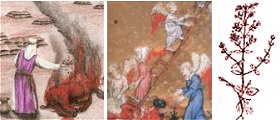
07.03.08 Jewish tradition says there were nine Red Heifers (parot hadumot) offered so far on behalf of the Jewish people. The first was offered by Moses and Eleazar; the second by Ezra the Scribe; two more were offered by Simon the Righteous and another two by Yochanan the High Priest; a seventh was offered by the prophet Elijah; the eighth by Hanamel the Egyptian, and the ninth by Yishmael the son of Piabi (15-16 AD). Jewish tradition says that the tenth (and final) Red Heifer will be burned by the Mashiach at the time of the rebuilding of the Temple (Mishnah, Parah 3:5).
Many well-meaning Christians get excited over occasional reports that a new Red Heifer has been born, understanding this to be a sign from God that the time to rebuild the Jewish Temple is at hand. But should a Red Heifer be found and later sacrificed, how should we regard this -- especially in light of the Brit Chadashah and its clear teaching that Yeshua is the substance of the what the shadow of the Red Heifer represents?
But when Messiah appeared as a High Priest of the good things that have come, then through the greater and more perfect tent (not made with hands, that is, not of this creation) he entered once for all into the holy places, not by means of the blood of goats and calves but by means of his own blood, thus securing an eternal redemption. For if the sprinkling of defiled persons with the blood of goats and bulls and with the ashes of a heifer sanctifies for the purification of the flesh, how much more will the blood of Messiah, who through the eternal Spirit offered himself without blemish to God, purify our conscience from dead works to serve the living God? Therefore he is the mediator of a new covenant, so that those who are called may receive the promised eternal inheritance, since a death has occurred that redeems them from the transgressions committed under the first covenant.
For where a will is involved, the death of the one who made it must be established. For a will takes effect only at death, since it is not in force as long as the one who made it is alive. Therefore not even the first covenant was inaugurated without blood. For when every commandment of the law had been declared by Moses to all the people, he took the blood of calves and goats, with water and scarlet wool and hyssop, and sprinkled both the book itself and all the people, saying, "This is the blood of the covenant that God commanded for you." And in the same way he sprinkled with the blood both the tent and all the vessels used in worship. Indeed, under the law almost everything is purified with blood, and without the shedding of blood there is no forgiveness of sins. Thus it was necessary for the copies of the heavenly things to be purified with these rites, but the heavenly things themselves with better sacrifices than these.
For Messiah has entered, not into holy places made with hands, which are copies of the true things, but into heaven itself, now to appear in the presence of God on our behalf. Nor was it to offer himself repeatedly, as the high priest enters the holy places every year with blood not his own, for then he would have had to suffer repeatedly since the foundation of the world. But as it is, he has appeared once for all at the end of the ages to put away sin by the sacrifice of himself. And just as it is appointed for man to die once, and after that comes judgment, so Christ, having been offered once to bear the sins of many, will appear a second time, not to deal with sin but to save those who are eagerly waiting for him (Hebrews 9:11-28).
Since Yeshua is the Substance of the shadow of the Red Heifer (Heb. 9:24, 10:1-2), His sacrifice as our High Priest after the order of Malki-Tzedek indeed preceded the "rebuilding" of the Temple (John 2:19) - though this Temple is one made without human hands by the Holy Spirit (Matt. 26:26-28, 1 Cor. 12:27, Eph. 4:4,11-12, Col. 1:24, etc.). The followers of the Messiah are now part of the Temple of His Body (1 Cor. 3:16, 12:27) and are called "living stones" (1 Pet. 2:5). The sacrifice of the tenth Red Heifer -- Yeshua -- instituted a new priesthood after the order of Malki-Tzedek (Heb. 5:10 with 1 Pet. 2:5) that replaces the older Levitical priesthood of Aaron (Heb. 13:10). Beloved, we have been cleansed from our sins by a better sprinkling than that which the tent of Moses could afford (Matt. 26:28, Heb. 9:14, 12:24, Eph. 1:7, 1 Pet. 1:2,18-19, Rom. 5:9; Col. 1:14, 1 John 1:7, etc.).
It is vital for us to remember that the Scriptures command us to "consider Yeshua, [who] has been counted worthy of more glory than Moses -- as much more glory as the builder of a house has more honor than the house itself" (Heb. 3:1-6). Yeshua alone is our great Kohen Gadol (High Priest) of the better covenant than Moses' (Heb. 8:6), and Yeshua alone is the Supreme Mediator between God and man. Only Yeshua brings God and man together.
Consider, then, how the New Testament plainly reveals that Yeshua is greater than Moses. Yeshua was greater than:
- The first Jew, Abraham (John 8:53-58)
- Israel and his children (John 4:12-14)
- Moses and all the angels (Heb. 3:1-6; Matt. 17:1-8; John 1:17; etc.)
- Solomon, the greatest king of Israel (Luke 11:31)
- Jonah, one of the greatest Jewish prophets (Matt. 12:41)
- Elijah, one of the greatest Jewish prophets (Matt. 17:1-8)
- The Temple itself (Matt. 12:6).
Indeed, Yeshua is said to "uphold the universe by the word of his power" (Heb. 1:3) and is called the very Creator (John 1:1-3; Col. 1:16-19) who sits upon the throne of God Himself (Psalm 45:6-7; Heb. 1:8). Simply put, Moses stands in relation to Yeshua as the creature stands before the Creator and is accountable to Him.
The "Church" is a called-out group of people from among all the nations who are made partakers of the covenantal blessings and redemptive purposes of the LORD God Almighty. It is what Rav Sha'ul termed a "mystery," meaning that it was undisclosed before the advent of the Messiah Yeshua. The entire history of ethnic Israel was accomplished in order to "get Yeshua to Moriah" - the place of ultimate sacrifice - where He would offer up His life for the sins of the world.... and thereby break the "spell" of the kelalah (curse).
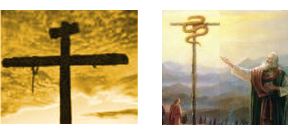
Yeshua at Moriah is the Central Point of all history. He is the Altar. All the outpouring of the wrath of God against sin was accomplished there, since it involved the torture and death of the only true Tzaddik who ever lived. Yet it was by means of Yeshua's righteous suffering that all the families of the earth may now be blessed and escape the kelalah of HaShem. It is finished -- by the hand of Yeshua -- not Moses. We are called to follow Him....
Pirke Avot - פרקי אבות
07.02.08 Since I recently wrote about the role of oral Torah in Jewish thinking, I thought it would be worthwhile to look at Pirke Avot ("The Chapters of the Fathers"), a popular collection of ethical maxims found in the Mishnah (i.e., the core text of the Talmud). Though it is found in part of Seder Nezikin (a section of the Mishnah concerned with legal liabilities), some scholars believe Pirke Avot originally was intended to be a summary of the entire Mishnah itself. At any rate, the tractate consists of six chapters of statements attributed to various Jewish sages of the Mishnaic period. Famous declarations such as, "The world stands on three things: Torah, service, and acts of loving kindness" (1:2); "If I am only for myself, who am I?" (1:14), and "You are not obligated to complete the work, but neither are you free to cease from doing it" (2:21), all come from this tractate of the Mishnah. In Jewish tradition it is customary to study a chapter a week of Pirke Avot during the six weeks between Pesach and Shavuot.
 |
Specific verses of Avot (called mishnahs) sometimes provide exegetical commentary for verses of Scripture that deal with practical godliness. For example, Avot 4:1 provides a quote from the sage Simon ben Zoma regarding Jeremiah 9:22-23[h]:
Ben Zoma said: Who is wise? (ezehu chacham?) He who learns from all men (ha-lomed mikol adam), as it is written: "I have gained understanding from all my teachers" (Psalm 119:99).
Who is mighty? (ezehu gibor?) He who subdues his passions (hakovesh et yitzro), as it is written: "One who is slow to anger is better than the mighty, and one whose temper is controlled than one who captures a city" (Proverbs 16:32).
Who is rich? (ezehu ashir?) He who rejoices in his portion (hasameach bechelko), as it is written: "You shall eat the fruit of the labor of your hands; you shall be happy, and it shall go well with you" (Psalm 128:2). "You shall be" refers to this world; and "it shall be well with you" refers to the world to come.
Who is honored? (ezehu m'khubar?) He that honors his fellow men (hamkhaber et habriyot) as it is written: "For those who honor me I will honor, and those who despise me shall be treated with contempt" (1 Samuel 2:30).
(Avot 4:1)
Such maxims of the Pirke Avot are often used as starting points for discussions about living a Jewish life, especially in the realm of personal ethics and godly living. For example, the mishnah above teaches us that in order to be wise we must be humble. We should recognize that every person, "no matter how small," can be our teacher. An acronym for the word "ego" I once heard is "easing God out." If we value our own thoughts more than the humble pursuit of wisdom, we are merely "rearranging our prejudices." Pride blinds us to the miracle of the other person as an agent of God's grace to our lives. The only acceptable role for pride is when we boast in the LORD and His glory (2 Cor. 10:17).
The mishnah also reminds us that true strength is the freedom to live in accordance with moral and spiritual truth. In Jewish tradition, the strong man (ish chayil) is not some macho-type fellow (let alone a "godfather of business" or forked-tongue politician), but rather is someone who overcomes the yetzer ha'ra - the evil inclination - and exercises godly self-control (Gal. 5:23). Therefore anger is often considered one of the worst of the middot ra'ot (bad qualities), since it enflames pride and leads to the loss of control. Uncontrolled anger is always a sign of spiritual disrepair...
Therefore Ben Zoma goes on to identify true riches with godly contentment. Constantly desiring things makes you a slave. You can never have enough. You can never be free of your covetous heart. But if you live in moment-by-moment surrender to God and His will for your life, you will experience serenity and inner peace. "Money can't buy you love," and neither can it buy you happiness. Some of the most wretched people are those who are wealthy in the things of this world but who are bankrupt in their ability to love and be loved (Prov. 15:15). Thankfulness, gratitude, and appreciation are the marks of a joyful person.
Finally, the mishnah reminds us of our need for shared dignity. We all want to be respected. If you show respect to others, they will honor you in turn. Giving honor to others is a way to demonstrate our love for them. Yeshua told us to "do unto others as we would have them do to us" (Matt. 7:12) and this necessarily involves honoring them as beings created b'tzelem Elohim (in the image of God). Recognizing the dignity and infinite worth of our fellow man is a way of giving honor to God (1 Sam. 2:30).
Should Messianic Jews and Christians study Pirke Avot? I think so, primarily because it provides the context of ethical and spiritual concerns that were embedded within the culture of Jesus and his disciples. In addition, the pursuit of wisdom is an ongoing responsibility for God's people (Prov. 3:13, 4:7; 16:16; Deut. 4:5-9, Isa. 11:2, Rom. 16:19, Col. 1:9, Eph. 5:15, James 3:13, etc.).
Many of our Western Church traditions are derived from pagan influences of Greece and Rome. Sadly the early Gentile "Church Fathers" seemed more interested in the "wisdom" (i.e., philosophical speculations) of the Greeks and the power politics of Rome than they were in the godly wisdom that flowed from the cultural heritage of Jesus and his disciples. The worldly ecclesiology of the early church fathers (such as Clement, Ignatius, Justin Martyr, Tertullian, Cyprian, etc.), moved the Church to mirror the hierarchialism of imperial Rome. This process began in earnest after the conversion of Constantine (c.272-337) who enlisted the Church as a means of political control. Symptoms of these pagan influences include: The institution of a tiered priestly class (with special vestments and duties) that created a fixed dichotomy between the "laity" and the "clergy"; the attribution of hallowed powers to the sacraments (and to those who administered them); the practice of delivering Greco-Roman style orations (i.e., sermons) to a captive audience; the rejection of the Sabbath day and the institution of "Sunday" worship, and so on. It should be noted that the Protestant Reformation did not truly reform the Church by returning it to its Jewish roots, but merely altered the role of the priest by substituting the idea of the pastor (and the sermon) as the means of mediation between the laity and God.
 |
Today many churches (including the innumerable "Protestant" and "Evangelical" varieties) continue to stay rooted in Greek/Roman paganism through their customs and self-serving traditions. Theologically, many of these church practices are justified by means of the fallacious doctrine known as "replacement theology." This institutionalized prejudice maintains that Jewish heritage and the promises made to ethnic Israel are irrelevant to the Christian, since "the Church" is now the true "Israel of God" (for more information, see this article). Consequently, promoting the Jewish literacy of practical godliness that Jesus' followers all were familiar with is rarely heard among most of today's Christian leaders. This is almost inexcusable for those who profess to be "clergy" of the Church, since God's plan was always to incorporate the nations into the Olive Tree of Israel... But how many Christians today are ignorant of the heritage that Jesus came to give them? How many of them understand that they are now part of remnant Israel? How many understand that they made partakers of the covenants given to the Jewish Patriarchs by means of a Jewish Savior who lived a distinctively Jewish life? Please recall Jesus' words spoken to the woman of Samaria: "Salvation is of the Jews" (John 4:22). When the Mashiach physically returns to Jerusalem to establish the Kingdom of God on earth and fulfill the covenantal promises made to Israel, will our churches be ready?
 |
Weariness of flesh
07.02.08 Much of my work here is done late at night, after my wife and child are asleep. There never is enough time to write, and I need a quiet place to intensely concentrate and pray when doing so. Often I go to bed near sunrise, sleep for a few hours, and then get up for my day job. I deal with chronic fatigue and pain...
Near the end of the somber book of Ecclesiastes, Kohelet says: "The words of the wise are like goads, and like nails firmly fixed are the collected sayings; they are given by one Shepherd. My son, beware of anything beyond these. Of making many books there is no limit, and much study is a weariness of the flesh" (Eccl. 12:11-12).
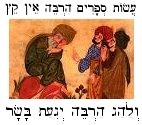
Indeed, as some of you know, there is a real "weariness of the flesh" from much study. If we would simply take hold of what we have been given, we could move past much of the preliminaries... Nonetheless, I feel constrained to do this work, especially because I believe time is preciously short. We are surely living in acharit hayamim - the end of days...
Some people have written to me and questioned my motives; some have asked why I don't blast the gospel message in a "simplified" way; still others have written to encourage me to press on. Like many of you, I turn to the LORD every day and ask Him to guide me... I depend on His power to get me through each day.
Sof davar ha-kol nishma, "the end of the matter, let us hear:" et-Elohim yera, v'et-mitzvotai shemor, ki-zeh kol-ha'adam (אֶת־הָאֱלהִים יְרָא וְאֶת־מִצְוֹתָיו שְׁמוֹר כִּי־זֶה כָּל־הָאָדָם): "Revere God and observe His commandments! For this is for all humanity" (Eccl. 12:13).
Parashat Chukat - פרשת חקת
07.01.08 This week's Torah portion (Chukat) includes the unusual ritual law of the Red Heifer (parah adumah) whose ashes purify those contaminated by contact with death. This ritual is considered chok (חק) within the Jewish tradition, meaning that it makes no rational sense. The Talmud states that of all the taryag mitzvot (613 commandments) in the Torah, this is the only one that wise King Solomon could not fathom, causing him to exclaim: "I said I would be wise, but it is far from me" (אָמַרְתִּי אֶחְכָּמָה וְהִיא רְחוֹקָה מִמֶּנִּ, Eccl. 7:23). However, as you will see, the symbolism of the parah adumah is a clear foreshadowing of the sacrifice of the Mashiach Yeshua that delivers us the power of death.

|






























